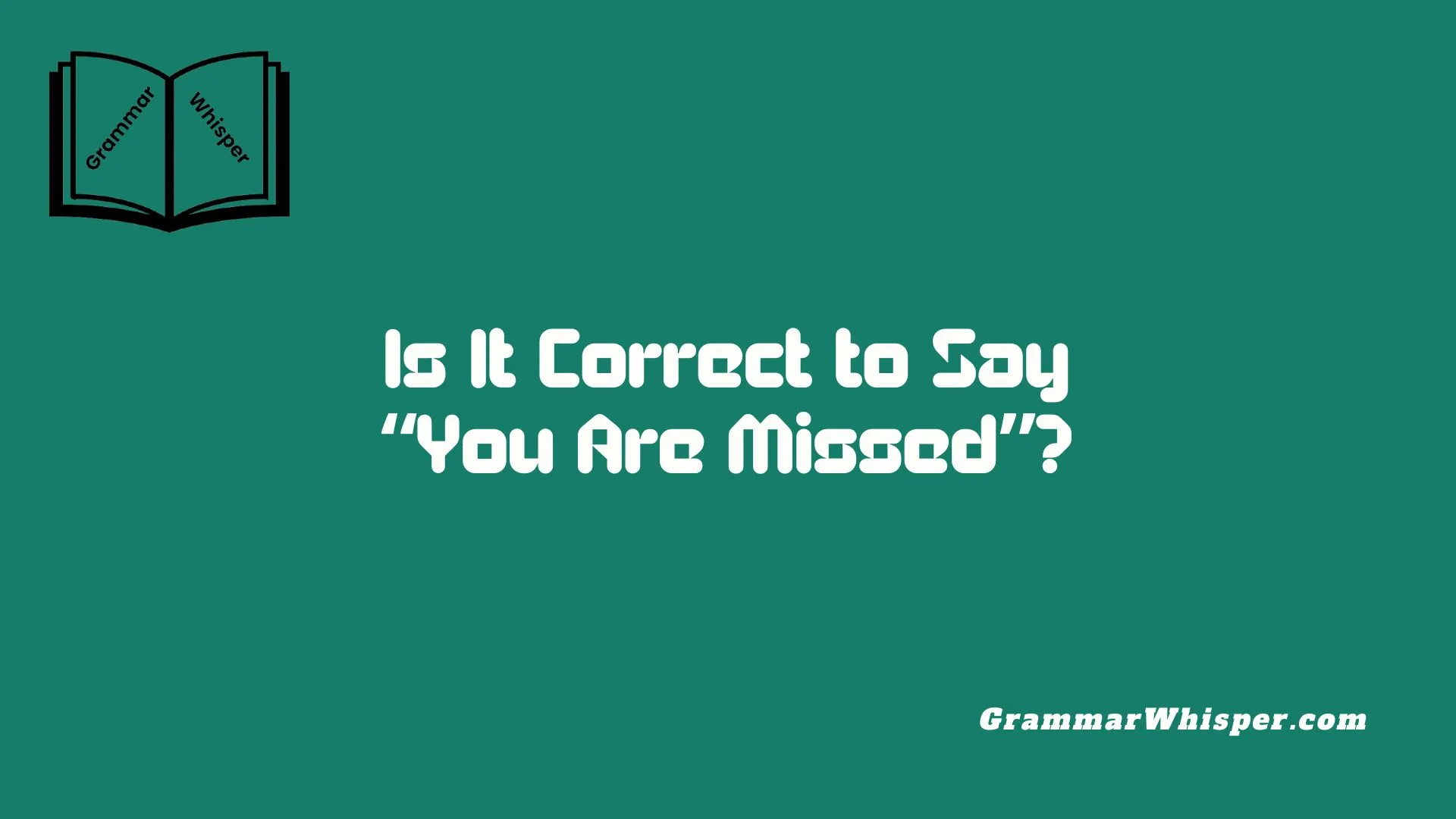Few things hit as gently and deeply as a late-night text saying, “You are missed.” It shows up in the quiet moment of reflection, in a heartfelt farewell card, or even whispered during a heavy goodbye. This tender phrase holds powerful emotional warmth without needing much explanation. It’s both linguistically valid and grammatically correct, but what makes it truly stand out is how emotionally impactful and universally understood this expression is. It resonates across all generations and cultures, speaking to the unspoken. With its subtle structure, it amplifies the quiet resonance of absence – something I realized firsthand when leaving a note for a former colleague. Simple as it sounds, it carries immense cultural impact.
In English, this phrase fits neatly into grammar rules, yet it shines because of its context-appropriate usages. Saying “You are missed” rather than “I miss you” shifts the attention, offering comfort without over-personalizing. It invites gentle alternatives when directness feels too sharp. At its core, it reflects experience, emotion, and perfect timing. What makes it special is its ability to be both flexible and exact – offering clarity while still expressing care. The emotional balance it strikes is rare, and when you say it with sincerity, it doesn’t just sound right – it feels right.
What Does “You Are Missed” Really Mean?
At face value, the phrase seems simple: someone is absent, and their absence is felt. But there’s more nuance beneath the surface.
“You are missed” essentially means:
“Someone is thinking about you in your absence and feels your lack.”
It’s not always clear who is doing the missing – which is the key distinction between this and more direct alternatives like “I miss you.”
Why Do We Use It?
- To express affection, loss, or appreciation without naming the subject.
- To add emotional distance or formality in professional or solemn settings.
- To deliver universal sentiment, especially in public communications (e.g., “To our fallen heroes, you are missed.”)
Is “You Are Missed” Grammatically Correct?
Yes, “You are missed” is grammatically sound. It follows standard English rules for passive voice.
Here’s the breakdown:
| Component | Role | Explanation |
| You | Subject | The person being missed |
| Are | Auxiliary verb | Present tense of “to be” |
| Missed | Past participle | From the verb “to miss” |
So, it follows this structure:
Subject + to be (conjugated) + past participle 👉 You + are + missed
This is a passive construction, where the doer of the action is implied rather than stated.
Understanding the Passive Voice in This Context
What Is Passive Voice?
In grammar, passive voice occurs when the object of an action becomes the subject of the sentence.
Active: I miss you. Passive: You are missed (by me).
In the passive version, the focus shifts away from the speaker and places emotional emphasis on the person being missed.
When Passive Voice Makes Sense
While passive voice is often avoided in clear writing, it works beautifully in emotional contexts. Why?
- It softens the tone
- It elevates formality or respect
- It focuses on the person missed, not the speaker
“You are missed” sounds reflective, tender, and occasionally solemn.
The Role of “To Be” in Forming the Passive Voice
The verb “to be” is foundational in English passive constructions. In “You are missed,” “are” is the present tense conjugation of “to be.”
Here’s how it works across tenses:
| Tense | Passive Form | Example Sentence |
| Present | are missed | You are missed every day. |
| Past | were missed | You were missed at the reunion. |
| Future | will be missed | You will be missed next week. |
| Present Perfect | have been missed | You have been missed lately. |
| Past Perfect | had been missed | You had been missed while you were gone. |
By tweaking the “to be” verb, you can match the emotional timing of your message to fit the moment.
When and Why Passive Voice Can Be More Powerful
Passive voice can be your best friend when:
- You want to highlight the subject being affected (the person missed).
- The person doing the action doesn’t matter or is understood from context.
- The setting is formal, public, or emotionally delicate.
Compare These Two:
Active: I miss you. Passive: You are missed.
Active voice sounds personal and direct. Passive voice adds a layer of emotional space, often appropriate in:
- Obituaries: “You are dearly missed.”
- Memorials: “Our soldiers are missed every day.”
- Corporate farewells: “You will be missed by all of us.”
When to Say “You Are Missed” (With Examples)
Let’s explore real-life situations where this phrase fits perfectly.
| Context | Example Phrase | Tone |
| Condolences | “You are deeply missed.” | Respectful |
| Long-Distance Love | “You are missed more than words can say.” | Romantic |
| Workplace Goodbye | “You are missed around the office.” | Appreciative |
| School Settings | “You’re missed in class.” | Friendly |
| Military Service | “You are missed every single day.” | Patriotic |
| Spiritual Ceremonies | “Though gone, you are missed.” | Reverent |
Using the phrase in these moments can be a comforting and powerful gesture.
Better Ways to Say “You Are Missed” (Alternatives)
Depending on context, tone, and relationship, here are some rich and heartfelt alternatives:
Formal Alternatives
- “Your absence is felt deeply.”
- “Your presence is sorely missed.”
- “You are fondly remembered.”
Casual Alternatives
- “We miss having you around.”
- “It’s not the same without you.”
- “Can’t wait to see you again!”
Romantic Expressions
- “I think about you every day.”
- “My heart misses you.”
- “You’ve left a space only you can fill.”
Friendly Versions
- “Hope you come back soon – we miss you!”
- “The place just isn’t the same.”
Matching the level of emotional intensity and relationship closeness is key here.
Saying It in the Active Voice: Does It Hit Harder?
Let’s break down the active vs. passive debate.
Active: “I miss you.”
- Direct, emotional, intimate
- Best for close relationships
- Focuses on the speaker’s emotion
Passive: “You are missed.”
- Formal, softer, universal
- Best for public settings, condolences
- Focuses on the person being missed
Emotional Impact Comparison:
| Voice | Strength of Emotion | Typical Use Case |
| Active | High | One-on-one conversations |
| Passive | Moderate to high | Public expressions, letters, speeches |
So yes, “I miss you” hits harder emotionally – but “You are missed” carries gravitas and dignity.
Emotional and Cultural Nuances in Expressing Absence
Culture shapes how we communicate affection and absence. Let’s compare a few:
Western Cultures:
- Prefer directness: “I miss you.”
- Use personal voice frequently.
Eastern Cultures:
- Favor indirect emotional expression
- May use passive constructions to show respect
Latin American Cultures:
- Highly expressive, might say: “Te extraño tanto” (I miss you so much) or “Me haces falta” (You are needed by me)
In some traditions, passive phrases like “You are missed” may feel more respectful, especially in public or spiritual settings.
Common Pitfalls and Misunderstandings
Despite being grammatically correct, “You are missed” can be misunderstood.
Common Issues:
- Overusing the passive voice can sound robotic.
- Saying it in inappropriate contexts can feel forced.
- Not personalizing it can make it lose emotional weight.
How to Avoid Them:
- Match the tone to the relationship.
- If unsure, opt for direct, clear language.
- Add details or names to personalize the message.
✅ Instead of just: “You are missed.” Try: “You are missed around the coffee machine every morning!”
Psychological Impact of Hearing “You Are Missed”
Words trigger emotions. And hearing you’re missed validates your value in someone’s life.
Science Says:
- Feelings of social inclusion reduce stress.
- A 2022 study by the Journal of Social Psychology showed that emotionally validating messages (like “You are missed”) increased oxytocin levels – the bonding hormone.
Why Passive Works:
- Allows the listener to feel valued without the pressure of reciprocation.
- Delivers comfort in sensitive situations, like grief or absence.
Passive doesn’t mean impersonal – it means soft, safe, and meaningful.
Final Thoughts
Language is a powerful tool. And when it comes to saying someone is missed, your choice of words matters.
Quick Reference: When to Use Each
| Scenario | Best Phrase | Voice |
| Intimate relationship | “I miss you.” | Active |
| Funeral or memorial | “You are dearly missed.” | Passive |
| Business farewell | “You will be missed.” | Passive |
| Friendly absence | “We miss you!” | Active |
| Diplomatic or indirect | “You are missed.” | Passive |
In Summary:
- ✅ “You are missed” is correct.
- ✅ It’s passive, but that’s not a bad thing.
- ✅ It works best in formal, tender, or group settings.
- ✅ You have many alternatives – choose based on relationship and tone.
- ✅ Use it with care, and it can carry enormous emotional weight.
📌 Table: Passive vs. Active in Missing Expressions
| Phrase | Voice | Use Case |
| “You are missed” | Passive | Public, formal, universal messages |
| “I miss you” | Active | Personal, direct expressions |
| “She is missed by all” | Passive | Memorials, group sentiments |
| “We miss your laughter” | Active | Warm, friendly notes |
FAQs
What does “You are missed” really mean?
It means someone feels your absence. The phrase doesn’t identify who is doing the missing – it’s implied. That’s why it works well in situations where the speaker wants to express collective or indirect emotion, like in public statements, condolence messages, or formal goodbyes.
Is it better to say “I miss you” or “You are missed”?
Both are correct, but the choice depends on the situation. “I miss you” is personal and direct, ideal for close relationships. “You are missed” is more formal or emotional and works best in speeches, memorials, or group messages where the subject being missed is the focus.
Is “You are missed” passive voice?
Yes. “You are missed” is a classic example of passive voice. The subject (you) receives the action (being missed), while the doer of the action is unstated. It’s a grammatically valid construction and is often used for its emotional softness and respectful tone.
When is it appropriate to use “You are missed”?
Use it when you want to express someone’s absence in a gentle, respectful, or formal way. Common contexts include:
- Obituaries or memorials
- Long-distance messages
- Workplace farewells
- Condolences
- Holiday greetings for someone who isn’t present
What are some heartfelt alternatives to “You are missed”?
Here are some emotionally rich alternatives based on context:
- Romantic: “I think about you all the time.”
- Formal: “Your presence is sincerely missed.”
- Friendly: “Things aren’t the same without you.”
- Memorial: “Forever in our hearts, you are deeply missed.”
Choose the version that best fits the tone and relationship.











